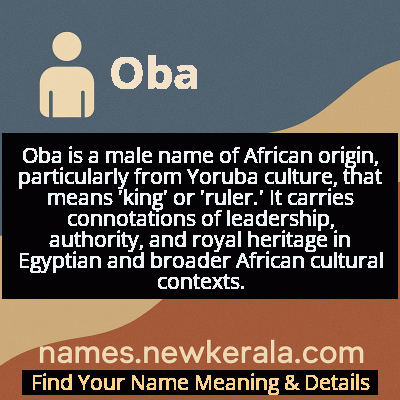Oba Name Meaning & Details
Origin, Popularity, Numerology Analysis & Name Meaning of Oba
Discover the origin, meaning, and cultural significance of the name OBA. Delve into its historical roots and explore the lasting impact it has had on communities and traditions.
Name
Oba
Gender
Male
Origin
Egyptian
Lucky Number
9
Meaning of the Name - Oba
Oba is a male name of African origin, particularly from Yoruba culture, that means 'king' or 'ruler.' It carries connotations of leadership, authority, and royal heritage in Egyptian and broader African cultural contexts.
Oba - Complete Numerology Analysis
Your Numerology Number
Based on Pythagorean Numerology System
Ruling Planet
Mars
Positive Nature
Generous, passionate, energetic, and humanitarian.
Negative Traits
Impulsive, impatient, moody, and can be overly emotional.
Lucky Colours
Red, maroon, scarlet.
Lucky Days
Tuesday.
Lucky Stones
Red coral, garnet.
Harmony Numbers
1, 2, 3, 6.
Best Suited Professions
Military, sports, philanthropy, leadership roles.
What People Like About You
Courage, energy, leadership, generosity.
Famous People Named Oba
Oba Chandler
Criminal
Notorious American criminal convicted of murder
Oba Femi
Professional Wrestler
Nigerian-American WWE wrestler known for his powerful physique
Oba Adeyemi III
Traditional Ruler
Alaafin of Oyo, one of Nigeria's most influential traditional monarchs
Name Variations & International Equivalents
Click on blue names to explore their detailed meanings. Gray names with will be available soon.
Cultural & Historical Significance
In Brazilian Candomblé and other Afro-diasporic religions, Oba is also recognized as an Orisha (deity) associated with rivers, marriage, and domestic life, representing the complexities of feminine power and sovereignty. The name carries centuries of royal heritage, symbolizing authority, tradition, and cultural preservation across the African diaspora. The cultural significance extends beyond Africa through the transatlantic slave trade, where the concept of Oba survived and evolved in new cultural contexts, maintaining its connection to African identity and resistance against cultural erasure.
Extended Personality Analysis
Individuals named Oba typically exhibit strong leadership qualities, natural authority, and a commanding presence that draws respect from others. They often possess an innate sense of responsibility and tend to be protective of those in their care, demonstrating the paternal qualities associated with traditional rulers. Oba's are frequently characterized by their decisive nature, strategic thinking, and ability to make difficult decisions under pressure. They value tradition and stability while also understanding the importance of adaptation and progress.
Their personality often blends wisdom with practicality, and they tend to be excellent mediators who can navigate complex social situations with grace and diplomacy. While they may appear reserved or formal in public, those close to them often discover a deeply caring and loyal individual who takes their responsibilities seriously but also knows when to show compassion and understanding. The name carries expectations of dignity and honor, and those named Oba often internalize these values, developing a strong moral compass and sense of duty that guides their actions and relationships throughout life.
Modern Usage & Popularity
In contemporary times, the name Oba maintains its royal connotations while becoming more accessible as a given name beyond traditional ruling families. It is particularly popular among Yoruba communities in Nigeria and the diaspora, where it serves as a connection to cultural heritage and ancestral pride. The name has seen increased usage in countries with significant African diaspora populations, including the United States, United Kingdom, and Brazil, where parents choose it to honor their roots and instill a sense of strength and leadership in their children. While not among the most common names globally, Oba has maintained steady usage and is often selected by parents seeking a name with deep cultural significance and powerful meaning. In recent years, there has been a resurgence of interest in traditional African names, contributing to Oba's continued relevance in modern naming practices.
Symbolic & Spiritual Meanings
Symbolically, Oba represents sovereignty, authority, and the sacred responsibility of leadership. It embodies the concept of divine kingship where the ruler serves as an intermediary between the spiritual and physical realms. The name carries connotations of protection, justice, and cultural continuity, symbolizing the pillar around which community identity revolves. Metaphorically, Oba represents the ideal of balanced power—strength tempered with wisdom, authority guided by compassion, and tradition that evolves with time. It symbolizes the connection between past and present, serving as a living link to ancestral heritage and cultural memory. The name also represents the idea of service leadership, where true power is demonstrated through responsibility to one's people rather than domination over them, making it a powerful symbol of ethical governance and community stewardship.

